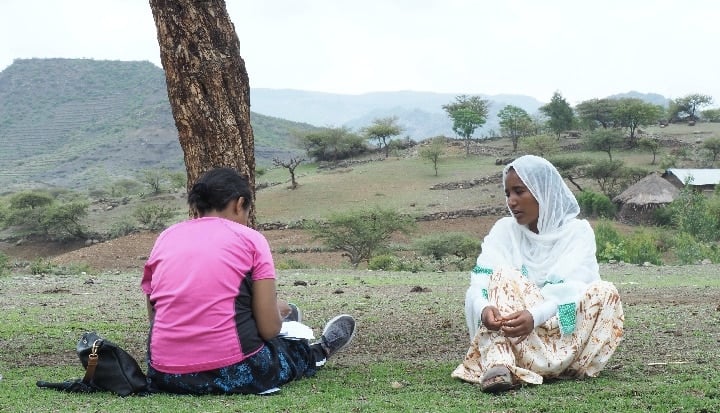Menstrual health and hygiene (MHH) is a term used to encapsulate the broader systemic factors that link menstruation with health, well-being, equity, empowerment, and individual rights. Around the world, MHH is challenged by the stigma and shame associated with menstruation, which affects the ability of menstruators to access a myriad of resources such as accurate and timely knowledge, safe and affordable materials, informed and comfortable professionals, referrals and access to health services, sanitation and washing facilities, positive social norms, safe and hygienic disposal options and advocacy opportunities. As iDE deepens our ability to support women that provide transformative change in the communities where we work, this was an area we knew we could not overlook. Leveraging our existing water, sanitation and hygiene (WASH) program, which primarily addresses solutions to open defecation, in several Ethiopian communities a team of iDE-ers sought to expand the organization’s approach through an exploratory study of MHH.
Led by Erin Mercado, an independant consultant with expertise in MHH and participatory approaches, Martha Gebeyehu, iDE Ethiopia’s WASH lead and Elise Mann, iDE’s global WASH senior manager, the group successfully won an internal grant for innovative projects to explore ways to study potential links between an MHH program and our existing WASH program. Using human-centered design (HCD), expert interviews, stakeholder analyses and desk research, the team matched entrepreneurial opportunities with the unmet needs of menstruators.
Due to iDE’s expertise in market sanitation, our initial exploration in rural communities within the Amhara Region of Ethiopia focused on supply and demand. A market analysis conducted by another organization revealed that around 99% of all commercial menstrual products in Ethiopia are imported, with the majority (80%) remaining in urban areas. In rural areas, supply and demand is a mutually reinforced problem confirmed by both the market analysis and interviews with shop owners, who said, after stocking their shops with commercial pads, “no one buys, so we don’t put it on our shelves anymore”. However, there is a steadily growing number of disposable and reusable pad production centers, and as educational and awareness programs grow across the country, access and demand is also projected to grow.
In our latest interviews, iDE asked participants to rank menstrual products from most to least preferred. The majority chose the reusable pad options, a couple selected the disposable pads and a rare few opted for the menstrual cup. This highlights a key tenet of what we learned from both field and external interviews with menstrual researchers and entrepreneurs who stress the importance of product options for menstruators as a way to ensure autonomy, agency and safety. Though the majority of people interviewed said they used local cloths and fabrics to manage their menses, a few stated that they sometimes travel to bigger towns to buy disposable products. No matter their product preference or use, menstruators value privacy – opting to wash, dry, and dispose of used materials when no one is home or at night when everyone else is asleep and finding immense comfort and use in gender separate latrines and latrines with doors. We also learned that menstrual education remains minimal and the taboo around menstruation is in large part due to religious and social stigmas around unwanted pregnancies. One interviewee mentioned that “people have different perspectives on menstruation; some consider us unclean, some suspect something happened to us”.As such, reducing stigmas and false assumptions regarding menstruation is integral to the ability of women and girls to fully participate in entrepreneurial and educational opportunities.
The information gathered by this pilot project has been used to inform MHH product producers in the local region, with future plans to scale up iDE’s own approaches to supporting MHH entrepreneurs. You can learn more about iDE’s market based approach to WASH and gender equality here.
Read more on Menstrual Health and Hygiene










